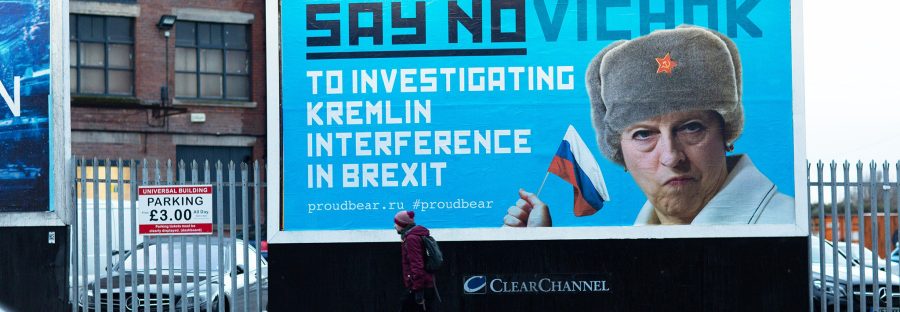Activist erect billboards under Russian GRU guise
- Billboards appearing to support a no deal Brexit outcome appear throughout Manchester
- Activist group disguised as Russian GRU agents claim responsibility
- Spook propaganda features Vladimir Putin and references to novichok
A group of activists disguised as Russian GRU agents are responsible for a series of satirical billboards throughout Manchester.
The spoof propaganda first appeared in London in November but now billboards with satirical messages have appeared all over Manchester.
The billboards sprung up overnight on the eve of the Brexit vote this week and could be found at Great Ancoats Street, Chancellor Lane and New Bury Road.

A website under the title of Proud Bear suggests the billboards were an attempt to sway MPs to vote for a no deal outcome for Brexit. The website says its aim is to ‘help people of England make freedom from the European Union and democracy voting’.
The group’s supposed leader, named as Colonel Alexander F. Titov, said: “Brexit was historic win for GRU and Russia-Britain friendship. Now we bring billboard campaign to mighty Manchester! We want that posters make MPs remember Russia is true friend of England, no EU.”
When asked about the aims of the campaign, Titov told the Northern Quota: “We want for United England to leave EU so your nation and ours can be free of Brussels diktat over so-called ‘human rights’. “Be free to be free” as we say in Russia.”
Inside the source code of their website a message in Russian describes the true aims of the Proud Bear campaign. Translated, part of it reads: “All of us are volunteers and are engaged in this project only because we are really concerned about the state of health of our democracy and the fact that not one of our leaders and a very small number of active politicians are willing to at least somehow move their goals and protect her.
“Theresa May prefers to promote Brexit’s ridiculous plan instead of stopping for a moment and truly investigating whether Russia’s influence was really decisive in the vote. The UK immediately needs a Muller-style investigation into Russian intervention in the Brexit campaign.”
In the days leading up to the referendum more than150,000 Russian Twitter accounts appeared, posting messages promoting the idea of leaving the EU. These messages, Proud Bear claims, reached more people than the official and unofficial leave campaigns combined.
Among these tweets, many of them were found to contain sacremongering subjects and the language used was often divisive. Attempts to increase tension on the subject of immigration were common, with similarities to the polarising tactics employed during the 2016 US presidential campaign, which many believe was influenced by Russia.
When asked about what was next for Proud Bear, Titov simply said: “Our campaign will continue.”


